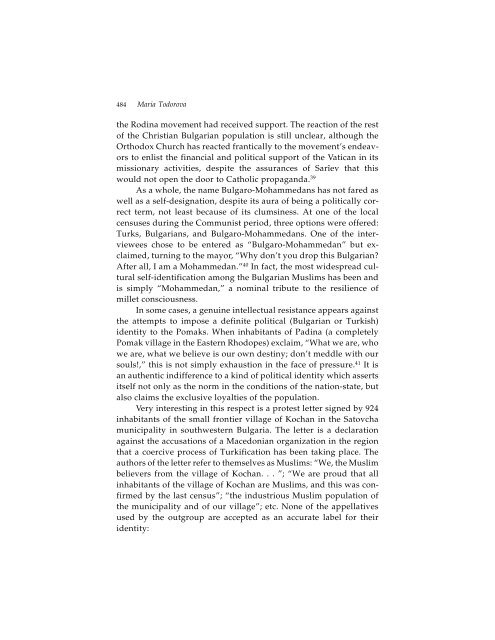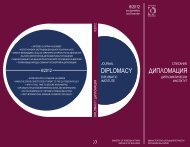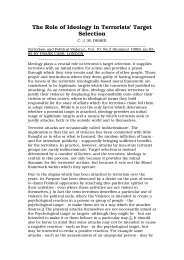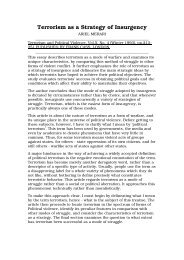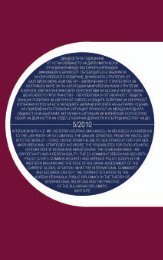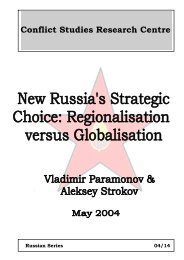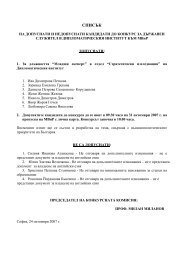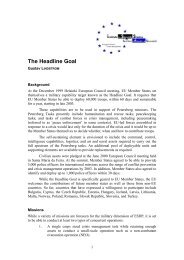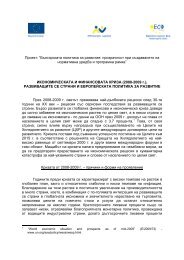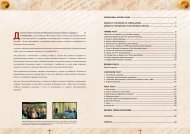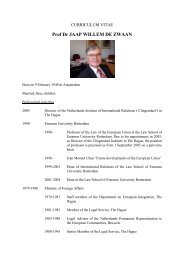The Myth of Ethnic Conflict: Chap 13 - Diplomatic Institute
The Myth of Ethnic Conflict: Chap 13 - Diplomatic Institute
The Myth of Ethnic Conflict: Chap 13 - Diplomatic Institute
Create successful ePaper yourself
Turn your PDF publications into a flip-book with our unique Google optimized e-Paper software.
484 Maria Todorova<br />
the Rodina movement had received support. <strong>The</strong> reaction <strong>of</strong> the rest<br />
<strong>of</strong> the Christian Bulgarian population is still unclear, although the<br />
Orthodox Church has reacted frantically to the movement’s endeavors<br />
to enlist the financial and political support <strong>of</strong> the Vatican in its<br />
missionary activities, despite the assurances <strong>of</strong> Sarîev that this<br />
would not open the door to Catholic propaganda. 39<br />
As a whole, the name Bulgaro-Mohammedans has not fared as<br />
well as a self-designation, despite its aura <strong>of</strong> being a politically correct<br />
term, not least because <strong>of</strong> its clumsiness. At one <strong>of</strong> the local<br />
censuses during the Communist period, three options were <strong>of</strong>fered:<br />
Turks, Bulgarians, and Bulgaro-Mohammedans. One <strong>of</strong> the interviewees<br />
chose to be entered as “Bulgaro-Mohammedan” but exclaimed,<br />
turning to the mayor, “Why don’t you drop this Bulgarian?<br />
After all, I am a Mohammedan.” 40 In fact, the most widespread cultural<br />
self-identification among the Bulgarian Muslims has been and<br />
is simply “Mohammedan,” a nominal tribute to the resilience <strong>of</strong><br />
millet consciousness.<br />
In some cases, a genuine intellectual resistance appears against<br />
the attempts to impose a definite political (Bulgarian or Turkish)<br />
identity to the Pomaks. When inhabitants <strong>of</strong> Padina (a completely<br />
Pomak village in the Eastern Rhodopes) exclaim, “What we are, who<br />
we are, what we believe is our own destiny; don’t meddle with our<br />
souls!,” this is not simply exhaustion in the face <strong>of</strong> pressure. 41 It is<br />
an authentic indifference to a kind <strong>of</strong> political identity which asserts<br />
itself not only as the norm in the conditions <strong>of</strong> the nation-state, but<br />
also claims the exclusive loyalties <strong>of</strong> the population.<br />
Very interesting in this respect is a protest letter signed by 924<br />
inhabitants <strong>of</strong> the small frontier village <strong>of</strong> Kochan in the Satovcha<br />
municipality in southwestern Bulgaria. <strong>The</strong> letter is a declaration<br />
against the accusations <strong>of</strong> a Macedonian organization in the region<br />
that a coercive process <strong>of</strong> Turkification has been taking place. <strong>The</strong><br />
authors <strong>of</strong> the letter refer to themselves as Muslims: “We, the Muslim<br />
believers from the village <strong>of</strong> Kochan. . . ”; “We are proud that all<br />
inhabitants <strong>of</strong> the village <strong>of</strong> Kochan are Muslims, and this was confirmed<br />
by the last census”; “the industrious Muslim population <strong>of</strong><br />
the municipality and <strong>of</strong> our village”; etc. None <strong>of</strong> the appellatives<br />
used by the outgroup are accepted as an accurate label for their<br />
identity:


